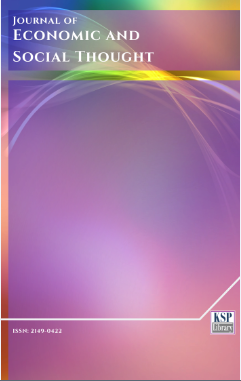The impact of institutional entrepreneurship on value co-creation in long-term care context: A case study
Abstract
Abstract. "Human-centered" is the core logic for long-term care development. Traditional though on value creation focuses on the financial profits generated in the transaction between product/service suppliers and customers. Differently, value co-creation emphasizes on collective creation of effective impacts (economic and social) via the knowledge and experiences exchanges between key stakeholders. Long-term care is a setting that deals both macro-level institutional and micro-level stakeholder behavioral concerns. The latter is embedded in the former; thus, it is critical to systematically discuss the influences of institutional change on the evolutionary value co-creation in long-term care context. The present article tries to search for theoretical essence and elements of value co-creation in long-term care, which is expected to be achieved jointly by service provider (the caring), receiver (the cared), the healthcare organization (e.g., hospitals), the government units, and other parties. Then the influences of institutional entrepreneurship’s changes on these theoretical elements of value co-creation would be discussed. The article sets to offer clearer understanding of what value co-creation is in the long-term care context and how institutional entrepreneurship can alter value co-creation. Implications for research, practices, and health policy were discussed.
Keywords. Institutional change, Long-term care, Value co-creation.
JEL. B14, B24, B51.Keywords
References
Auh, S., Bell, S.J., Mcleod, C.S., & Shih, E. (2007). Co-production and customer loyalty in financial service. Journal of Retailing, 83(3), 359-370. doi. 10.1016/j.jretai.2007.03.001
Chang C.-W., Wang-Irene, H., & Chan, Y.-A. (2010). Investigating the antecedents and consequences of patient participation in medical services: A case of general surgery. Journal of Management and Business Research, 27(6), 603-621. doi. 10.6504/JOM.2010.27.06.04
Chen, H.-Z. (2004). Long-Term Care Practice. Taipei: Yongda.
Chen Q.-G., Xie, M.-C., Xie, A.-J., Yu C.-X. (2010). The use of value co-creation concept to develop a customer-oriented service business model: Case study on home tele-heath service. Journal of Welfare Science and Service Management, 1(2), 27-45.
Di Maggio, J.P., & Powell, W.W. (1983). The iron cage revisited: Institutional isomorphism and collective rationality in organizational Fields, ASR, 48, 147-160.
Ennew, C.T., & Binks, M.R. (1999). Impact of participative servicer relationships on quality satisfaction and retention: An exploratory study. Journal of Business Research, 46(2), 121-132. doi. 10.1016/S0148-2963(98)00016-2
Kane, R.A., & Kane, R.L. (1998). Long-Term Care: Principles, Programs and Policies. New York: Springer.
Lee, S.-D. (2012). Defining and operating/action of long-term care. Leadership Nursing, 13(1), 2-13.
Lin Q.-Y. (1989). Theoretical reflections on institutional schools: Taiwan's educational organization's reform experience. National Science Council (Edt.), National Science Council of the Executive Yuan 87-89 Annual Sociology of the Academy of Special Topics Research Achievements Proceedings, (pp.465-482). Taipei: National Science Council of the Executive Yuan.
Ministry of Health and Welfare (2016). Ten Years Long Term Care Plan 2.0 (approved version). Taipei: Ministry of Health and Welfare.
Porter, M.E. (1985). Technology and competitive advantage. Journal of Business Strategy, 5(3), 60-78. doi. 10.1108/eb039075
Porter, M., & Teisberg, E.O. (2014). Medical Revolution. Wang Zhi-Hong translation. Taipei: the World.
Prahalad, C.K., & Ramaswamy, V. (2004). Co-creationexperiences: The next practice in value creation. Journalof Interactive Marketing, 18(4), 5-14. doi. 10.1002/dir.20015
Porter, M. (2007). How physicians can change the future of health care. Journal of American Medical Association, 297(10),1103-1111. doi. 10.1001/jama.297.10.1103
Qiu, W.-H., Zhu, L.-S., Ji, H.-R., Zhang, Y.-J., Zhang, Y.-C., Zhang, B.-R. (2012). Exploring evolution of value creation by service innovations in hospital industry based on the perspective of medical ethics and customer value. Journal of Management and Business Research, 29(5), 489-512. doi. 10.6504/JOM.2012.29.05.04
Selznick, A. (1996). Institutionalism “old“ and “new”. ASQ, 41(2), 270-277. doi. 10.2307/2393719
Xie, Z.-J. (2016). Teacher education reform and its impact on teachers colleges in Taiwan: An analysis and reflections based on sociological institutionalism. Journal of Research in Education Sciences, 61(2), 29-56. doi. 10.6209/JORIES.2016.61(2).02
Vargo, S.L., Maglio, P.P., & Akaka, M.A. (2008). On value and value co-creation: A service systems and service logic perspective. European Management Journal, 26(3), 145-152. doi. 10.1016/j.emj.2008.04.003
Woodruff, R.B. (1997). Customer value: The next source of competitive advantage, Journal of the Academy of Marketing Science, 25(2), 139-153. doi. 10.1007/BF02894350
Weissert, W.G., & Hedrick, S.C. (1994). Lessons learned from research on effects of community based long-term care. Journal of American Geriatric Society, 42, 348-353. doi. 10.1111/j.1532-5415.1994.tb01763.xDOI: http://dx.doi.org/10.1453/jest.v6i4.1991
Refbacks
- There are currently no refbacks.
Journal of Economic and Social Thought - J. Econ. Soc. Thoug. - JEST - www.kspjournals.org
ISSN: 2149-0422
Editor: jest@ksplibrary.org Secretarial: secretarial@ksplibrary.org Istanbul - Turkey.
Copyright © KSP Library




